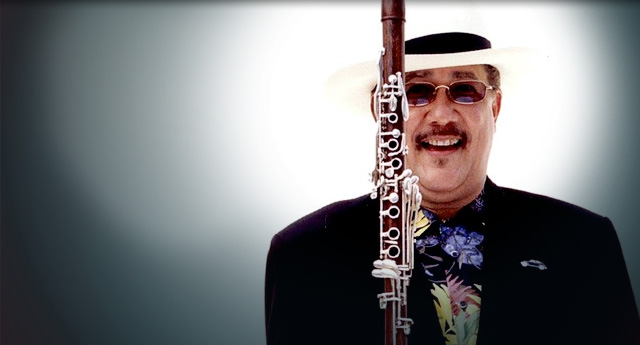Home > Jazz / Blues
11/28/2017
Paquito D'Rivera at PSU Fall Concert
By MICHAEL CONLEY // The Cuban Maestro plays with some of Portland's finest musicians and music students. He " delighted the packed house with his extraordinary musicianship."
The PSU Fall Jazz Concert featured woodwind soloist Paquito D'Rivera held at Portland State University School of Music and Theater in partnership with Soul Patch Music Productions on Monday, November 27 at Lincoln Hall.
Paquito D'Rivera has long been one of my favorite saxophone players so I couldn't pass up the opportunity to see him here in Portland. Apparently the last time he played in the area was in 1982.
There is much biographical info I could include about this artist's storied career, beginning as a child in Cuba and his numerous awards and accolades. He is someone I count as an influence on my own woodwind playing, with much to admire in his deep roots in classical clarinet literature applied to saxophone pyrotechnics.
D'Rivera was introduced by PSU professor Darrell Grant, new Dean of Performing Arts Leroy Bynum, Vahagn Khachaturian of Soul Patch, and local band leader Bobby Torres.
The concert started with a couple of chamber pieces by D'Rivera himself, with piano, cello and clarinet. One was called "Wapango", accompanied by cellist Hamilton Cheifetz and Darrel Grant, followed by "Invitacion al Danzon", where Julia Hwakyu-Lee played the piano. These pieces established a high level of musical artistry for the evening. The Danzon piece at one point had the cello briefly playing a line reminiscent of Guantanamera, but with a wider harmonic arc.
D'Rivera's long been known for his affinity for classical music as well as Jazz and Latin dance forms and here he did not disappoint, with astonishing command and wonderful Bach-like melodic invention.
While many saxophonists double on clarinet, few display the relaxed bravura D'Rivera brings to the demanding instrument. Sweeping glissandi, tumbling arpeggios and high notes with the punctuation of cut crystal gush from his horn like sparkling sunfish.
Next were 4 pieces in a sextet setting featuring world-class multi-instrumentalist and PSU professor George Colligan in the piano chair and trumpeter Derek Sims. Eric Gruber played the bass with Micah Hummel on drums and Chris Johnedis on percussion. These are all local guys and they did the Portland scene proud.
The segment started with a dedication to Jesus "Chucho" Valdez, Mr. D'Rivera's co-leader in the sensational Cuban group Irakere, where each of them first attained renown. He said his song "Chucho" was actually based on a piece written by Valdez. In an amusing antidote about stealing songs he revealed his strategy of stealing parts of the music and shamelessly dedicating the reconfigured piece to its originator, and it was very funny the way said it.
This number introduced the leader's alto saxophone and the first of a series of quotes from famous songs sprinkled into his solos, which were also packed with perfectly accented 4-note cells uncoiled into precise, stabbing rhythms and creamy longer notes.
D'Rivera's tone has aged like añejo rum and is more molasses than vinegar in its present vintage. Yes he can scream, but it never sounds like he is yelling.
Back on clarinet, the band addressed "Manha de Carnaval", the famous theme by Louis Bonfa from the classic movie "Black Orpheus". This song choice was a surprise for such a concert setting, in that it is so frequently played at jam sessions it may be considered a "warhorse". But D'Rivera's take evoked all the things that make the piece so gratifying as an improvisational vehicle- great chords, the persistent bossa rhythm, and the dramatic form all were exploited masterfully, with the full range of the clarinet- the stately chalemeau, the noble clarion, the soaring altissimo, pivoting seamlessly from his wonderfully supple and sensual throat tones.
This song was also an occasion for Derek Sims to play a buttery flugelhorn on the second part of the theme and on his solo. The leader was clearly moved by George Colligan's powerful solo on this number. D'Rivera played a nice cadenza here before ending with the famous tag.
"A Night in Tunisia", another iconic standard, was next. They always talk about Dizzy Gillespie at Latin jazz gigs and Paquito kicked off Diz's most famous hit with just a couple of arpeggios- but played with a certain inflection that let everybody in the band know how he wanted them to come in. I was hoping that that he would take the fabulous first break on the interlude to this tune, the two spectacular bars made immortal by Charlie Parker, the Bird, that 2-bar break which Cannonball Adderly himself said is nearly impossible to count it is so sophisticated. Derek Sims took the first break though so we had to wait till the end of the song for Paquito to come out of the interlude with his own fabulous break and a cadenza before ending the number.
The last sextet piece, the original song "To Brenda With Love", had a lot of baroque up in it. In fact of any jazz musician I have heard none so effortlessly employs such obvious classical technique and precision while breathing the fire of jazz through a horn to a beat you want to dance to. On this song he completely laid bare his debt to Bach. In fact at one point George Colligan played a solo piano interlude- a stream of 16th notes packed with musical information courtesy of Bach, soon to be matched by the star playing the same line on the saxophone, which is not easy just from the logistics of breathing somewhere in that relentless stream of notes.
When the band came back in they all played the song's theme again and another chorus of the Bach-like thing before the ending. It was a very effective example of integrating classical music with the fire of Latin jazz.
After an intermission Darrel Grant took the stage for the second set with the 17-piece Bravo Youth Orchestra D'Rivera Winds. I don't think they were named after Maestro Paquito, however it was a nice coincidence. They played an arrangement of "C Jam Blues" by Grant, featuring himself on piano with a band that was curiously devoid of saxophones. It was clarinets, trombones, trumpets and flutes and one French horn.
These were young students with limited chops, but Grant's protean accompaniment did not talk down to the children. It was an interesting approach to performing with kids.
The kid's group played another piece with a couple of of ringers from the college band, doing "Manteca", another Dizzy Gillespie number- and this time D'Rivera joined on clarinet. I was struck by the maestro's consideration for the young musicians when he moved a music stand that was blocking the audience view of the kids during a rest in his part. I found that thoughtful and kind. Again Paquito peppered his solo with quotes- this time from "Tequila", "Salt Peanuts", and the rock anthem "Na Na Na Na Hey Hey Hey Goodbye"
The PSU Jazz Ensemble, a big band directed by Derek Sims, took the stage following the Bravo group. We heard local composer/arranger Gordon Lee's cleverly titled "Hoy Veo", set to a medium Latin groove with a slight Yiddish accent, followed by "Which Craft" by Tom Kubis and Bob Mintzer's "Slo Funk". The PSU group had alternating players on bass, piano and drums, each acquitting himself well.
By now we were ready for more Paquito and he gave another amusing verbal intro, this time educating us about Astor Piazzola and performing the Argentinian composer's famous "Libertango", with its hypnotic shifting backgrounds and deceptively gentle dramatic tensions in the melody. Some of the PSU musicians had some solo parts in this arrangement, including a sweet trumpet lead by Katy Craighead.
"Everybody knows Diz loved the music of illegal aliens," was the quip providing the rationale for the blend of Bolero and Bossa rhythms of D'Rivera's "I Remember Diz". This one had some exposed clarinet lines by D'Rivera doubled alternately by Chang Park on trumpet and Nichole McCabe on soprano sax. The leader also doubled down on the quotes here, segueing from a moody cadenza to comedic sing-a-long, with snippets of Vivaldi, Mozart and Beethoven answered vocally by the musically literate audience, which clearly enjoyed the antics of this easy-going virtuoso.
Samba for Carmen was the closer, with D'Rivera engaging McCabe this time in an alto sax duet in the middle, again with the quotes- "There Will Never Be Another You", "Jingle Bells" -- the laughing sound effect- but these worked as a musical joke rather than coming off as a gimmick. It must have been quite the spot for the young PSU sax player. The bustling samba groove provided a nice showcase for the drummer on this one, who kept his cool controlling the hot tempo.
Also worth noting was the texture added to the ensemble by the slightly distorted humming of a solid-body electric guitar, appropriately low in the mix, also hidden by double music stands, played by Zach Pronath-Holden.
Paquito D'Rivera delighted the packed house with his extraordinary musicianship and entertaining demeanor, avoiding any high-brow pedantry while skillfully bridging enormous stylistic leaps between Jazz, Latin, and classical music. I urge readers to check out future concerts presented by PSU and Soul Patch Music Productions.
Michael "Shoehorn" Conley is a Portland saxophonist, tap dancer, composer.








